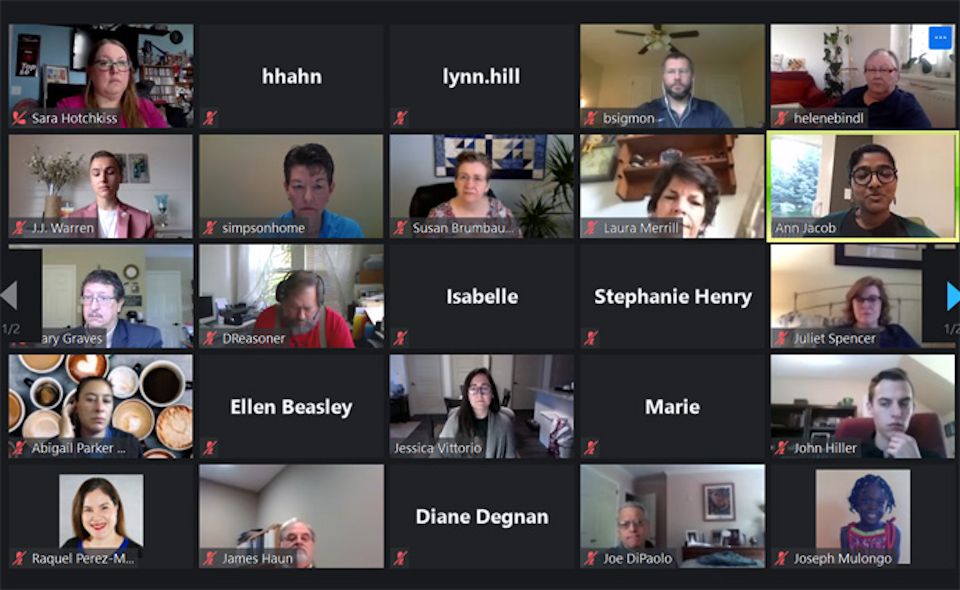The 2020 General and Jurisdictional conferences were postponed because of COVID-19. New 2021 dates were announced on May 26 along with a leadership plan for the NCJ.
May 26, 2020 — The Commission on the General Conference and the Council of Bishops (COB) have announced new 2021 dates for General and Jurisdictional conferences following the postponement of the events due to the COVID-19 pandemic.
The quadrennial legislative event will take place on August 29 – September 7, 2021, at the Minneapolis Convention Center in Minneapolis, Minnesota. The Jurisdictional Conferences in the United States will be held November 10-12, 2021. The Michigan Area is part of the North Central Jurisdictional Conference that will be held in Ft. Wayne, Indiana.
GC stays in Minneapolis
“We’re grateful that we were able to secure new dates while keeping the site of General Conference in Minneapolis. Nearly seven years of pre-planning and preparations by the host team have gone into this event,” said Kim Simpson, chair of the Commission on the General Conference.
The Commission decided to focus on 2021 as it was not feasible to schedule any earlier with so much uncertainty over international travel and the spread of COVID-19. Business manager Sara Hotchkiss was authorized by the Commission in March to pursue negotiations for new dates with the venue and area hotels after the Convention Center canceled May events due to concerns over coronavirus.
Hotchkiss said that it was surprising to find an available time block long enough to accommodate General Conference needs with so much competition for event space and lodging with other events shifting their dates as well.
“The hospitality industry has been devastated by COVID-19 with staffing levels significantly reduced, so negotiating amid the pandemic was a much slower process. I am grateful for our partnerships in the industry we have built over the years that assisted us in getting our foot in the door early enough to find any dates in 2021,” said Hotchkiss. “Another challenge was to secure agreements for the number of hotel rooms and room types that we needed. Again, many of our partners faced furloughs and reduced staff hours.”
In making the announcement, the Commission expressed regret that they were not able to accommodate a request from a group of young delegates regarding the reported dates of the postponed General Conference. The group asked the Commission to not schedule meeting dates that would conflict with the start of the academic year in the United States. They cited concerns that the timing would disproportionately affect young leaders and hinder their participation, as well as that of educators who might not be able to take off work at that time.
Concern for young Adults
The leadership of the Commission met with the group and invited them to address the full Commission, which includes young adult members, at their May 16 meeting to hear the requests directly and consider their concerns.
“Including young adults in the General Conference is always an important consideration. We affirm that their voices need to be heard,” said Simpson. “Unfortunately, this request did not come to the Commission until late in the process. By that time, the available dates were secured, and any attempt to change the dates would endanger the carrying forward of the deposits to the newly agreed-upon dates. This is at least a half-million dollars. To move the event now would require either finding a new meeting location and host annual conference(s) or pushing the event to 2022, both of which would involve canceling contracts and significant penalties.”
Simpson said the impact would go beyond finances. “To meet in 2021, if at all possible, is very important in the life of the church. Many things hinge on the dates for General Conference. Pushing it to 2022 affects budgets, jurisdictional conferences, central conferences, the election of bishops, bishops’ retirement dates, terms of office of general agency boards, and elected denominational leadership. After listening carefully and discussing it thoroughly, we felt we had to proceed with the dates we’ve secured.”

Hotchkiss said, “Our partners in the hospitality industry moved mountains in good faith with us to help us find dates for a postponed General Conference. There could be significant repercussions, not just financially, but also affecting those who would even be willing to assist us into the future if we do not honor our agreements and all the work that has gone into this.”
However, the Commission did take steps to address a second request contained in a letter from the young adult group to consider alternative methods of accommodating full participation, including utilizing technology to enable virtual voting.
In response to this request, the Commission voted to gather a group of creative thinkers, including young delegates, to explore the implications of options for accommodating full participation at General Conference, including, but not limited to, the possibility of utilizing technology and online voting at the General Conference. The recommendations of this group will be presented to the Commission for consideration.
“We know this would not be a simple task,” said Simpson. “We must consider the integrity of the voting and credentialing processes, legal ramifications, and the global nature of our church.”
Jurisdictional Conference planning
Following the official setting of the General Conference dates, Bishop Cynthia Fierro Harvey, President of the COB, contacted Jurisdictional Conference secretaries and heads of delegations. Dates for Jurisdictional Conferences were intentionally chosen to follow the next General Conference session. The bishops have the authority to set dates for the Jurisdictional Conferences as per Division Two – Section II – Article IV of The Constitution of The United Methodist Church (¶26 of The Book of Discipline 2016). As per ¶30 of The Book of Discipline, Central Conferences outside the United States will be held within a year following the postponed 2020 General Conference that will now be held in 2021.
“The Council of Bishops encourages the entire United Methodist Church to continue in deep, unceasing prayer for the Holy Spirit to guide us through these unprecedented times of challenges brought by the COVID-19 pandemic. God, who has been with us on this journey, will see us through and bring us together in praise and worship,” Harvey’s call letter stated.
Bishop David Bard, President of the NCJ College of Bishops announced, on May 27, their plan for providing episcopal leadership for the period between September 1, 2020, through December 31, 2021.
The Council of Bishops (COB) has approved Phase 1 of the NCJ plan for episcopal oversight that involves the retirements of both Bishop Sally Dyck and Bishop Bruce Ough. Dyck’s retirement date has changed to January 1, 2021, extending her leadership of the Northern Illinois Conference through the end of this year. She will then serve, in vocational retirement, as the Ecumenical Officer of the COB. Ough’s retirement will also be effective January 1, 2021, continuing his service to the Dakotas-Minnesota Area. After the first of the year, he, too, will be in vocational retirement as the Executive Secretary of the COB.
By June 30 of this year, the NCJ College of Bishops will submit a plan to the COB for NCJ leadership in 2021 for both Northern Illinois and Dakotas-Minnesota areas. In addition, they will be working on a broader plan for the 2020-2024 quadrennium and beyond. This long-range planning will be done in consultation with the NCJ and Area Committees on the Episcopacy, and NCJ Mission Council. “We will continue,” Bard said, “in a spirit of discernment, weighing various possibilities and asking missional questions.”
Bard explains, “In preparation for what was to be the 2020-2024 quadrennium, our jurisdiction had established an Episcopal Leadership Task Force comprised of persons from the college, the Committee on the Episcopacy, and our jurisdictional Mission Council. The primary impetus for this task force was a joint recommendation of the College of Bishops and the Committee on the Episcopacy to the jurisdiction that we move from nine to eight active bishops for the 2020-2024 quadrennium. This task force will continue to do its work, now focusing on the period 2022-2024.”
Last Updated on September 20, 2022

